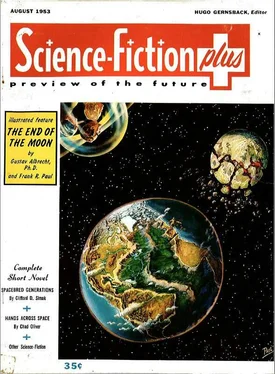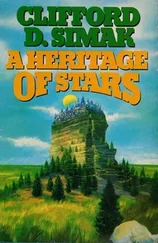THEREwere no games that "day," there were no hikes, there was no revelry in the amusement lounge. There were knots of frightened people talking. There was praying in the chapel where hung the largest of the Holy Pictures, showing the Tree and the Flowers and the River and the House far off, with a sky that had Clouds in it and a Wind you could not see, but only knew was there. There was a picking up and a straightening up of the cubicles in preparation for a "night" of sleeping and a rehanging once again of the Holy Pictures that were the prized possession of each cubicle. There was a taking down of ladders.
Mary Hoff rescued the Holy Picture from the debris on the floor and Jon stood one of the chairs against the wall and hung it upon the wall-that-once-had-been-the-floor and wondered how it happened that each of the Holy Pictures was a little different from all the others of them. And it was the first time he had ever wondered that.
The Hoff's Holy Picture had a Tree in it, too, and there were Sheep beneath the Tree and a Fence and Brook, and in the corner of the picture there were some tiny Flowers, and, of course, the Grass that ran up to the Sky.
After he had hung the picture and Mary had gone off to another cubicle to talk in horror-stricken, old-wife fashion with some of the other women, Jon went down the corridor, strolling as casually as he could so no one would notice him, so that no one would mark any hurry in him.
But there was hurry in him—a sudden, terrible hurry that tried to push him on like two hands against his back.
He tried to look as if he were doing nothing more than genteelly killing time. It was easy for him, for that was all he'd done his entire life, all that any of them had ever done. Except the few, the lucky or unlucky ones, whichever way you might look at it, who had the hereditary jobs—tending the hydroponic gardens [1] Hydroponics is the art of growing plants in water with added chemical nutrients instead of soil. The feasibility of hydroponics has been well demonstrated in many experiments, but so far has not proved in any case I know of to be economically successful. Chemicals necessary to plant growth are carbon, oxygen, hydrogen, nitrogen, potassium, calcium, magnesium, sulphur, phosphorus, and iron. Small quantities of boron, zinc, manganese and copper also are required. Molybdenum is necessary in extremely minute quantities. On board a spaceship, hydroponics would be an ideal way to produce food, with the added advantage that the plant growth would aid in atmospheric engineering by absorbing carbon dioxide and releasing oxygen. In hydroponics aboard a spaceship there would be no seasons; crops would be growing all the time. Although some insect pests might exist, to start with, these probably would be eradicated after a human generation or less, so that the crops would be pest-free. The same situation would exist so far as plant disease is concerned. Once either pests or disease were eliminated within a spaceship there would be no further danger, since reinfection from other crop areas could not occur. Since there would be on board a spares hip nothing equivalent to sunlight, necessary for the growth of plants, the deficiency would have to be supplied by the use of lamps.— The Author
or the cattle pens or the poultry flocks.
But the most of them, thought Jon, loitering his way along, had done no more than grow expert in the art of killing time. Like he and Joe, with their endless chess games and the careful records that they kept of every move they made, of every move and game. And the hours they spent in analyzing their play from the records that they made, carefully annotating each decisive move. And why not, he asked himself—why not record and annotate the games? What else was there to do? What else?
There were no people now in the corridor and it had grown dimmer, for now there were only occasional light bulbs to drive back the darkness. Years of bulb-snatching to keep the living cubicles supplied had nearly stripped the Ship.
He came to an observation blister and ducked into it, crouching just inside of it, waiting patiently and watching back along his trail. He waited for the one who might have followed him and he knew there would be no one, but there might be someone and he couldn't take the chance.
No one came, and he went on again, coming to the broken-down escalator which went to the central levels, and here, once again, there was something different. Always before, as he had climbed level after level, he had steadily lost weight, lost the pull against his feet, had swam rather than walked toward the center of the Ship. But this time there was no loss of weight, this time there was no swimming. He trudged broken escalator after broken escalator for all the sixteen decks.
He went in darkness now, for here the bulbs were entirely gone, snatched or burned out over many years. He felt his way upward, with his hand along the guide-rails, feeling the cross-draft of the corridors that plunged down the great Ship's length.
He came at last to the proper level and felt his way along until he came to the hiding place, a dispensary room with a pharmaceutical locker against one wall.
He found the proper drawer and pulled it open and his hand went in and found the three things that he knew were there—the Letter, Book, and a bulb.
He ran his hand along the wall until he found the outlet and when he found it inserted the bulb and there was light in the tiny room, light upon the dust that lay across the floor and along the counter tops, light upon the wash basin and the sink, the empty cabinets with their idly open doors.
He laid the Letter face up beneath the light and read the words that were printed in block letters:
TO BE OPENED ONLY IN EMERGENCY.
He stood there for a long time, considering. There had been the Mutter.
The stars were standing still.
Emergency, he thought. This is emergency.
For had it not been spoken that when the Mutter came and the stars stood still the End was near at hand?
And if the End were near at hand, then it was emergency.
He lifted the Letter in his hand and held it, hesitating. When he opened it, that would be the end of it. There would be no more handing down, no more of the Letter and the Reading. For this was the moment toward which the Letter had traveled down through time, from father to son for many generations.
Slowly he turned the Letter over and ran a thumbnail along the sealed edge and the dry wax cracked open and the flap sprang loose.
He reached in and took the message out and spread it flat upon the counter top underneath the lamp. He read, his lips moving to form whispered words, reading as one must read who had spelled out the slow meaning of his words from an ancient dictionary:
To the son of my son many times removed:
They will have told you and by this time you may well believe that the ship is a way of life, that it started in a myth and moves toward a legend and that there is no meaning to be sought within its actuality and no purpose.
It would be fruitless for me to try to tell you the meaning or the purpose of the ship, for while these words are true, by themselves they will have little weight against the perversion of the truth which by the time you read this may have reached the stature of religion.
But there is purpose in the ship, although even now, as this is written, the purpose has been lost, and as the ship plunges on its way it will remain not only lost, but buried beneath the weight of human rationalizing.
In the day that this is read there will be explanations of the ship and the people in it, but there will be no knowledge in the explanations.
To bring the ship to its destination there must be knowledge. There is a way that knowledge may be gained. I, who will be dead, whose body will have gone back into a plant long eaten, a piece of cloth long worn out, a molecule of oxygen, a pinch of fertilizer, have preserved that knowledge for you. On the second sheet of this letter are the directions for the acquiring of that knowledge.
Читать дальше










